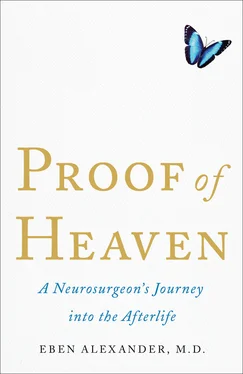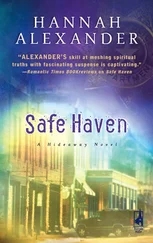From the instant I saw Chuck’s pilot chute emerge, I had a fraction of a second to react. For it would take less than a second to tumble through his deploying main parachute, and—quite likely—right into Chuck himself. At that speed, if I hit his arm or his leg I would take it right off, dealing myself a fatal blow in the process. If I hit him directly, both our bodies would essentially explode.
People say things move more slowly in situations like this, and they’re right. My mind watched the action in the microseconds that followed as if it were watching a movie in slow motion.
The instant I saw the pilot chute, my arms flew to my sides and I straightened my body into a head dive, bending ever so slightly at the hips. The verticality gave me increased speed, and the bend allowed my body to add first a little, then a blast of horizontal motion as my body became an efficient wing, sending me zipping past Chuck just in front of his colorful blossoming Para-Commander parachute.
I passed him going at over 150 miles per hour, or 220 feet per second. Given that speed, I doubt he saw the expression on my face. But if he had, he would have seen a look of sheer astonishment. Somehow I had reacted in microseconds to a situation that, had I actually had time to think about it, would have been much too complex for me to deal with.
And yet… I had dealt with it, and we both landed safely. It was as if, presented with a situation that required more than its usual ability to respond, my brain had become, for a moment, superpowered.
How had I done it? Over the course of my twenty-plus-year career in academic neurosurgery—of studying the brain, observing how it works, and operating on it—I have had plenty of opportunities to ponder this very question. I finally chalked it up to the fact that the brain is truly an extraordinary device: more extraordinary than we can even guess.
I realize now that the real answer to that question is much more profound. But I had to go through a complete metamorphosis of my life and worldview to glimpse that answer. This book is about the events that changed my mind on the matter. They convinced me that, as marvelous a mechanism as the brain is, it was not my brain that saved my life that day at all. What sprang into action the second Chuck’s chute started to open was another, much deeper part of me. A part that could move so fast because it was not stuck in time at all, the way the brain and body are.
This was the same part of me, in fact, that had made me so homesick for the skies as a kid. It’s not only the smartest part of us, but the deepest part as well, yet for most of my adult life I was unable to believe in it.
But I do believe now, and the pages that follow will tell you why.
I’m a neurosurgeon.
I graduated from the University of North Carolina at Chapel Hill in 1976 with a major in chemistry and earned my M.D. at Duke University Medical School in 1980. During my eleven years of medical school and residency training at Duke as well as Massachusetts General Hospital and Harvard, I focused on neuroendocrinology, the study of the interactions between the nervous system and the endocrine system—the series of glands that release the hormones that direct most of your body’s activities. I also spent two of those eleven years investigating how blood vessels in one area of the brain react pathologically when there is bleeding into it from an aneurysm—a syndrome known as cerebral vasospasm.
After completing a fellowship in cerebrovascular neurosurgery in Newcastle-Upon-Tyne in the United Kingdom, I spent fifteen years on the faculty of Harvard Medical School as an associate professor of surgery, with a specialization in neurosurgery. During those years I operated on countless patients, many of them with severe, life-threatening brain conditions.
Most of my research work involved the development of advanced technical procedures like stereotactic radiosurgery, a technique that allows surgeons to precisely guide beams of radiation to specific targets deep in the brain without affecting adjacent areas. I also helped develop magnetic resonance image–guided neurosurgical procedures instrumental in repairing hard-to-treat brain conditions like tumors and vascular disorders. During those years I also authored or coauthored more than 150 chapters and papers for peer-reviewed medical journals and presented my findings at more than two hundred medical conferences around the world.
In short, I devoted myself to science. Using the tools of modern medicine to help and to heal people, and to learn more about the workings of the human body and brain, was my life’s calling. I felt immeasurably lucky to have found it. More important, I had a beautiful wife and two lovely children, and while I was in many ways married to my work, I did not neglect my family, which I considered the other great blessing in my life. On many counts I was a very lucky man, and I knew it.
On November 10, 2008, however, at age fifty-four, my luck seemed to run out. I was struck by a rare illness and thrown into a coma for seven days. During that time, my entire neocortex—the outer surface of the brain, the part that makes us human—was shut down. Inoperative. In essence, absent.
When your brain is absent, you are absent, too. As a neurosurgeon, I’d heard many stories over the years of people who had strange experiences, usually after suffering cardiac arrest: stories of traveling to mysterious, wonderful landscapes; of talking to dead relatives—even of meeting God Himself.
Wonderful stuff, no question. But all of it, in my opinion, was pure fantasy. What caused the otherworldly types of experiences that such people so often report? I didn’t claim to know, but I did know that they were brain-based. All of consciousness is. If you don’t have a working brain, you can’t be conscious.
This is because the brain is the machine that produces consciousness in the first place. When the machine breaks down, consciousness stops. As vastly complicated and mysterious as the actual mechanics of brain processes are, in essence the matter is as simple as that. Pull the plug and the TV goes dead. The show is over, no matter how much you might have been enjoying it.
Or so I would have told you before my own brain crashed.
During my coma my brain wasn’t working improperly—it wasn’t working at all . I now believe that this might have been what was responsible for the depth and intensity of the near-death experience (NDE) that I myself underwent during it. Many of the NDEs reported happen when a person’s heart has shut down for a while. In those cases, the neocortex is temporarily inactivated, but generally not too damaged, provided that the flow of oxygenated blood is restored through cardiopulmonary resuscitation or reactivation of cardiac function within four minutes or so. But in my case, the neocortex was out of the picture. I was encountering the reality of a world of consciousness that existed completely free of the limitations of my physical brain .
Mine was in some ways a perfect storm of near-death experiences. As a practicing neurosurgeon with decades of research and hands-on work in the operating room behind me, I was in a better-than-average position to judge not only the reality but also the implications of what happened to me.
Those implications are tremendous beyond description. My experience showed me that the death of the body and the brain are not the end of consciousness, that human experience continues beyond the grave. More important, it continues under the gaze of a God who loves and cares about each one of us and about where the universe itself and all the beings within it are ultimately going.
The place I went was real. Real in a way that makes the life we’re living here and now completely dreamlike by comparison. This doesn’t mean I don’t value the life I’m living now, however. In fact, I value it more than I ever did before. I do so because I now see it in its true context.
Читать дальше












